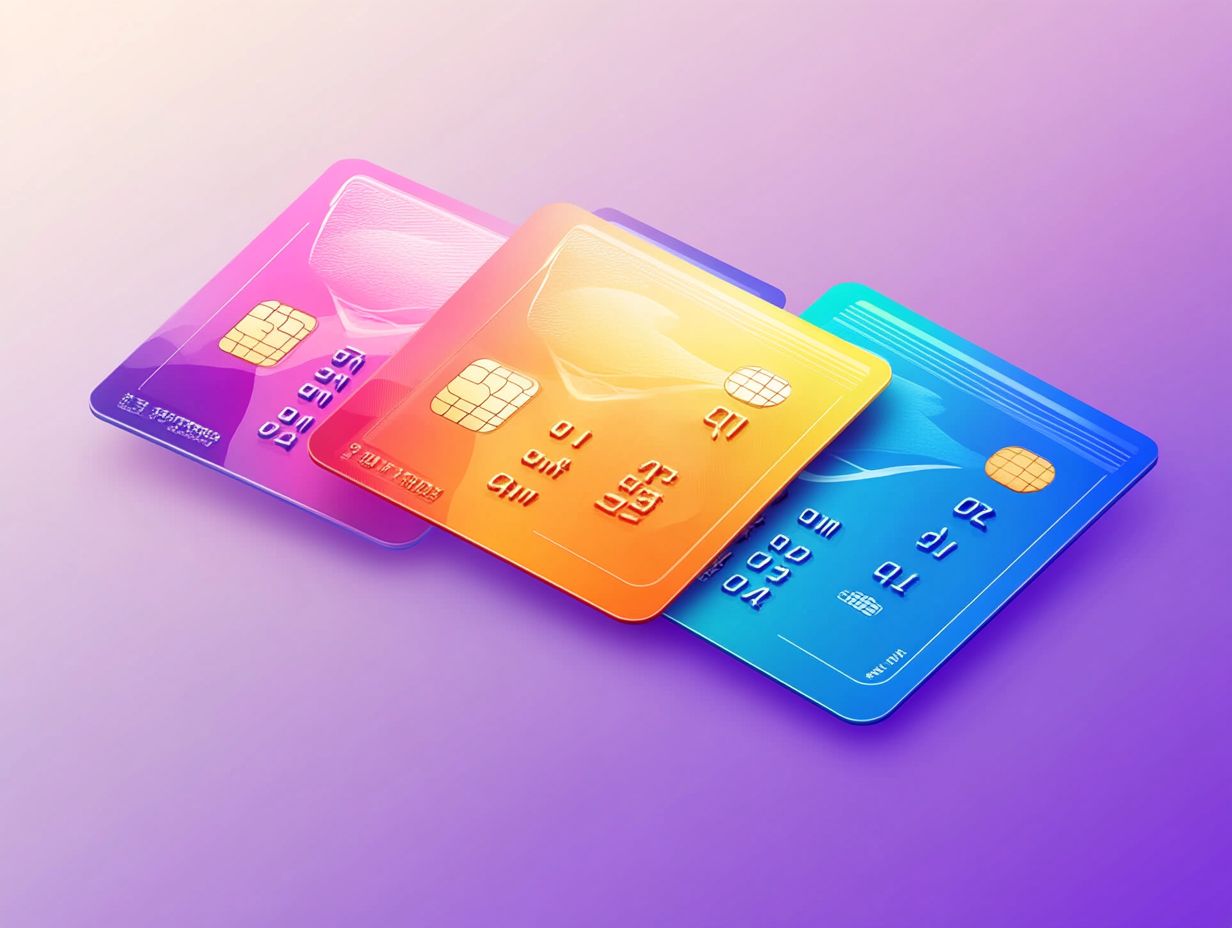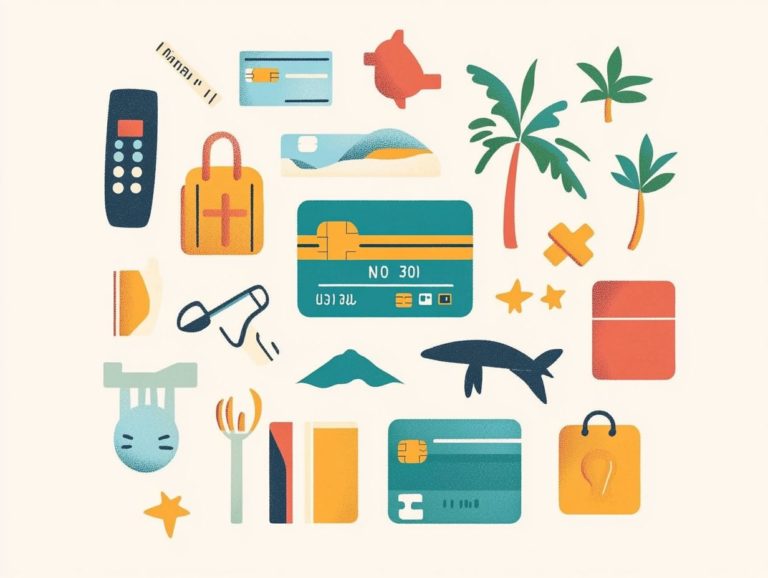5 Features That Differentiate Credit Cards
Choosing the right credit card can feel like navigating a labyrinth, especially with the myriad of options at your fingertips.
This article delves into five key features that distinguish credit cards from one another: credit limits, interest rates, rewards, annual fees, and their influence on your credit score.
You will also uncover the various types of credit cards, weighing their pros and cons, and learn how to sidestep common pitfalls.
By the end of your reading journey, you ll possess the insights necessary to select the perfect card tailored to your financial needs, along with strategies for effective management.
Whether you’re a first-time user or simply seeking to optimize your current card, this guide is designed to empower you.
Contents
- Key Takeaways:
- 1. Credit Limit
- 2. Interest Rates
- 3. Rewards and Benefits
- 4. Annual Fees
- 5. Credit Score Impact
- What Are the Different Types of Credit Cards?
- Frequently Asked Questions
- What are the 5 features that differentiate credit cards?
- How do interest rates differ among credit cards?
- What types of rewards programs are available on credit cards?
- What are credit limits and how do they differ among credit cards?
- What are introductory offers on credit cards?
- What types of fees and charges should I be aware of when choosing a credit card?
Key Takeaways:

- Your credit limit dictates how much you can spend and can be adjusted based on your finances.
- Interest rates can vary significantly, impacting your overall credit costs.
- Rewards such as cash back and travel points add extra value to your cards.
1. Credit Limit
The credit limit on your credit card defines the maximum amount you can borrow. It plays a pivotal role in your personal finance decisions. This limit influences everything from your spending habits to how much of your credit limit you are using, which is closely monitored by respected card issuers and financial institutions.
Maintaining a healthy credit score is crucial, as it often dictates the credit limit you ll be offered by various issuers, including major players like Capital One and Discover.
These issuers regularly evaluate your financial profile, considering factors such as your income, existing debts, and the length of your credit history to determine appropriate credit limits. For example, if you have a strong income and a solid credit history, you may qualify for higher limits, granting you not only greater purchasing power but also enhanced financial flexibility.
This flexibility is especially helpful during emergencies or for significant purchases. It enables you to manage expenses without an immediate cash outlay. Additionally, the benefits go beyond just buying essentials; there are 5 reasons to choose a travel credit card, which include potential rewards and cash back on larger transactions, making responsible credit usage even more rewarding.
2. Interest Rates
Interest rates on credit cards can differ significantly. Securing a low rate is often crucial for effectively managing your monthly payments while keeping borrowing expenses to a minimum. It’s essential to understand the average APR and how your credit score impacts your options when selecting financial products, especially balance transfer cards, which can deliver substantial savings if you’re carrying debt.
Fixed rates offer predictability, making monthly budgeting easier, while variable rates can fluctuate with market conditions. It’s important to evaluate which option aligns best with your financial situation. If you have a strong credit history, you may be eligible for more favorable terms, allowing you to secure lower interest rates that can significantly reduce your overall credit costs.
Balance transfer cards can be a game-changer. They enable you to shift high-interest debt to an account with a zero or low introductory rate, enhancing your ability to pay down existing balances efficiently and save on interest payments.
Don’t miss out on these opportunities! Understanding these features can change your financial future.
3. Rewards and Benefits
Rewards programs linked to credit cards can provide substantial benefits, ranging from cash back on everyday purchases to travel rewards that elevate your personal finance strategy. It s no wonder that rewards credit cards have become a popular choice among savvy consumers like you.
The allure of enticing welcome bonuses and flexible rewards structures allows you to maximize your spending in various ways. These programs come in different flavors, featuring options like travel cards linked to a specific airline or hotel that earn points for airline miles or hotel stays.
This creates a personalized experience for those who travel frequently. Cash back rewards can translate into immediate savings on essentials like groceries or gas, making them a compelling incentive for you.
By strategically spending with these cards, you not only enhance your rewards but also stay aware of the the detailed rules and conditions to sidestep potential pitfalls such as high-interest rates or annual fees.
Understanding the details can help you make the most of your credit card benefits. It s essential to grasp the nuances of each program, enabling you to make informed decisions and fully reap the benefits these cards have to offer.
4. Annual Fees

While some credit cards come with an annual fee, there are plenty of options that don t. This allows you to enhance your money management without any extra costs.
Understanding the implications of choosing between a card with an annual fee and one without can greatly influence your financial decisions. Cards with an annual fee frequently offer better rewards programs, including higher cash back rates, enticing travel perks, or exclusive access to special events.
No annual fee cards may still offer decent rewards, but they often have less appealing terms. When deciding whether the benefits of an annual fee justify the costs, reflect on your personal spending habits and how often you can realistically earn rewards.
For instance, a premium travel card that charges an annual fee might present extensive benefits that make its cost worthwhile for frequent travelers. In contrast, everyday spenders are likely to see greater value in cash back options that come without the fee.
5. Credit Score Impact
The impact of credit cards on your credit score is significant. Factors like credit utilization and timely monthly payments play crucial roles in shaping your credit report.
By focusing on these elements, you can effectively navigate the intricate landscape of credit management. For example, maintaining a low credit utilization ratio ideally below 30% is vital, as it demonstrates responsible borrowing habits.
A solid payment history, characterized by consistent and timely payments, can greatly enhance your credit standing. The length of your credit history also carries weight; longer accounts indicate stability and reliability.
To optimize your credit card use, consider setting up automatic payments and regularly monitoring your credit reports for any inaccuracies. These practices not only promote a healthy credit score but also lay the groundwork for long-term financial success.
What Are the Different Types of Credit Cards?
Credit cards come in various forms, each tailored to meet your specific needs and preferences. Whether you’re drawn to rewards credit cards for earning points or cash back, travel credit cards for your globe-trotting adventures, or student credit cards designed to help young adults build credit responsibly, it’s important to know the top features to look for in a credit card to make informed choices.
Familiarizing yourself with types like secured credit cards, balance transfer cards, and co-branded credit cards will help you make informed choices that align with your financial goals.
Grasping the unique features of each card type can significantly influence your financial strategy. For instance, rewards credit cards often boast enticing sign-up bonuses and varying rewards rates. Additionally, understanding features that add value to your credit card can enhance your benefits. Balance transfer cards can help you manage existing debt with low or even zero percent introductory APRs (Annual Percentage Rates).
Secured credit cards offer a pathway to rebuilding or establishing credit if you’re working with a limited credit history. By evaluating your individual spending habits such as monthly expenses and travel frequency you can select the card that not only boosts your purchasing power but also complements your financial objectives, ensuring a balanced and rewarding credit experience.
What Are the Pros and Cons of Each Type?
Each type of credit card has its own unique pros and cons, shaping your choices and financial decisions. The rewards structure and associated fees can vary greatly across different financial institutions. To make an informed decision, consider exploring 5 unique credit card features you’ll appreciate when selecting a card that aligns with your spending habits and financial goals.
Some cards offer generous cashback on everyday purchases, making them perfect if you prioritize everyday savings. However, these cards might come with higher annual fees or interest rates, which could be a drawback if you occasionally carry a balance.
On the flip side, travel rewards cards cater to frequent travelers by providing miles or points that can be redeemed for flights and hotel stays. The downside could be limited acceptance of rewards and potential blackout dates that may put a damper on your travel plans.
Ultimately, understanding how each card type meets your varying needs will enable you to make informed choices and maximize your benefits.
How Can One Choose the Right Credit Card for Their Needs?

Choosing the right credit card demands a thoughtful approach to your financial needs, spending habits, and money management goals. Different cards come with unique features, including 5 features of business credit cards designed for specific lifestyles and priorities. By looking at your credit history, potential interest rates, and available rewards programs, you can make informed financial decisions that align with your objectives.
Start by reviewing your monthly expenses to pinpoint common spending categories, such as groceries, travel, and entertainment. This initial assessment will reveal which types of rewards could offer you the most value.
Next, comparing the various fees linked to each card, including annual fees, foreign transaction charges, and any late payment penalties, is crucial.
Understanding how credit scores affect eligibility and interest rates is also vital. By following these steps and utilizing online comparison tools, you can discover a credit card that not only meets your financial needs but also enhances your overall financial health.
Dive into your financial journey today and find the card that suits you best!
What Are the Common Mistakes People Make with Credit Cards?
Several common mistakes can impede your effective use of credit cards, such as overspending, neglecting to pay your monthly balances, and failing to monitor your credit score. These mistakes can lead to poor financial decisions and negatively affect your money management.
Identifying and steering clear of these pitfalls is essential for maintaining healthy spending habits and enhancing your financial standing. For instance, many people overlook the importance of setting a budget that incorporates credit card spending, resulting in unexpected debt accumulation. Missing payment deadlines incurs late fees and can significantly harm your credit score.
To navigate these challenges, it s crucial to establish a realistic budget that accommodates credit use and to set up auto-pay for at least the minimum amount due. Regularly reviewing your credit reports can provide valuable insights into your financial health, fostering greater awareness and encouraging responsible credit card usage.
By taking proactive steps, you can cultivate a more stable financial future.
How Can One Effectively Manage Their Credit Card Usage?
Effectively managing your credit card usage is essential for maintaining a healthy credit score and ensuring responsible money management. This means keeping an eye on your spending habits, staying within your credit limits, and making timely payments to avoid the pitfalls of debt accumulation.
By utilizing financial tools and strategies, you can optimize your credit utilization and enhance your overall financial health. To begin, consider creating a realistic budget that accommodates your monthly expenses. This will help you allocate funds wisely and steer clear of overspending.
Setting up reminders or alerts for payment due dates is a smart move; it ensures that you never miss a bill and helps you avoid late fees, which can negatively impact your credit score.
Tracking your spending through various apps or tools offers you a clear picture of your financial habits, enabling you to make necessary adjustments when needed. Understanding credit utilization ratios is crucial, as this ratio shows how much of your available credit you are using. This directly influences your credit score and lending opportunities, making it vital for your financial success.
What Are the Future Trends for Credit Cards?
The future of credit cards is evolving rapidly, influenced by technological advancements, shifting consumer preferences, and a growing demand for enhanced consumer protections. This evolution will reshape the financial products you can choose from!
You’ll notice emerging trends like contactless payments, mobile wallets, and innovative cash back credit card features reshaping how you interact with your credit cards. As these developments unfold, it’s essential to recognize how different demographics are embracing these innovations, especially younger consumers who are more tech-savvy and prioritize seamless experiences.
This shift may prompt issuers to enhance their digital banking features and streamline approval processes, making it significantly easier for you to manage your finances. Regulatory changes designed to protect consumer data and prevent fraud are likely to foster a new level of trust.
This paves the way for innovative products that prioritize security while appealing to a broader range of users, including you.
Frequently Asked Questions

What are the 5 features that differentiate credit cards?
- Interest rates
- Rewards programs
- Credit limits
- Introductory offers
- Fees and charges
How do interest rates differ among credit cards?
Interest rates can vary among credit cards, with some offering low introductory rates and others having higher ongoing rates. It’s important to compare interest rates when choosing a credit card to ensure you are getting the best deal.
What types of rewards programs are available on credit cards?
Credit cards may offer a variety of rewards programs, such as cash back, points, or travel rewards. These programs allow cardholders to earn rewards for their spending and can be a major factor in choosing a credit card.
Reflect on your credit card habits today and consider sharing your experiences!
What are credit limits and how do they differ among credit cards?
Credit limits are the maximum amounts you can borrow on your credit card. They vary by card and depend on factors like your credit score and income.
Choosing a card with the right credit limit can help you manage your finances better. Make sure it meets your spending needs!
What are introductory offers on credit cards?
Introductory offers attract new cardholders with exciting promotions. These often include a 0% Annual Percentage Rate (APR) for a limited time or bonus rewards points.
Read the fine print carefully to know when these offers end. Don t miss out on great deals!
What types of fees and charges should I be aware of when choosing a credit card?
When selecting a credit card, pay attention to various fees. Common ones include annual fees, foreign transaction fees, and late payment fees.
Understanding these costs can help you make a better decision. Don t let unexpected charges catch you off guard!






